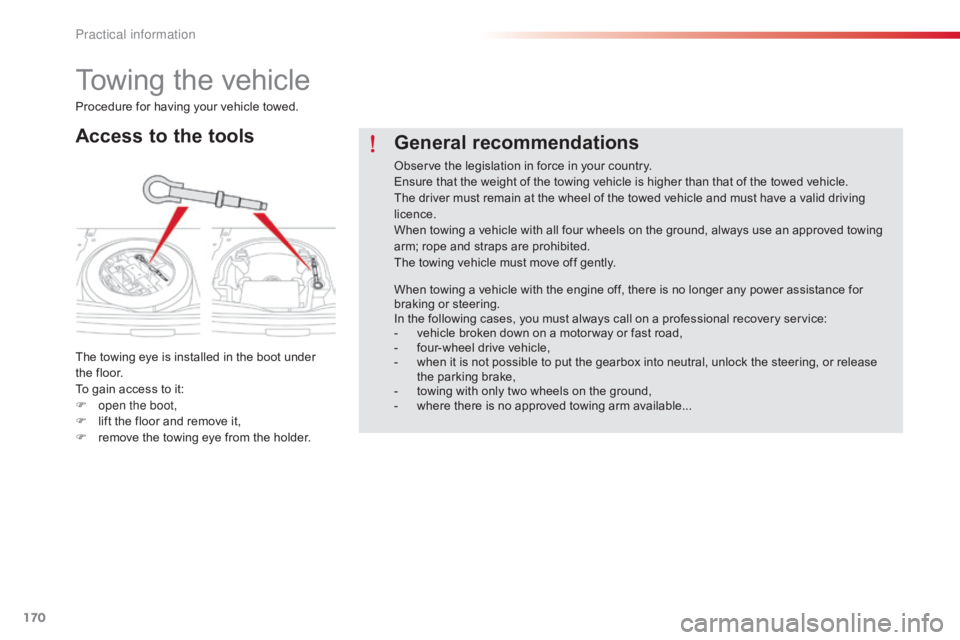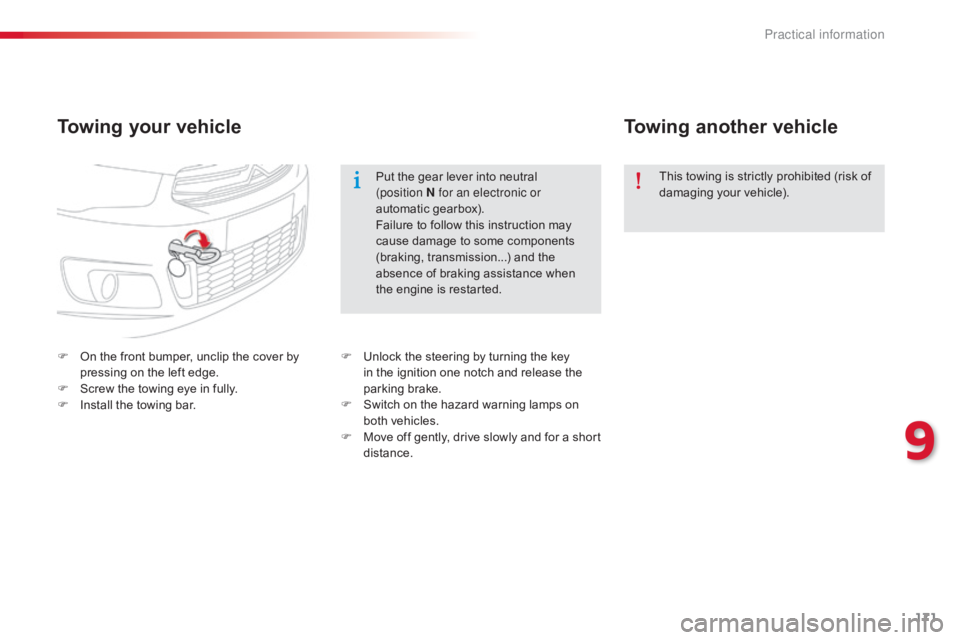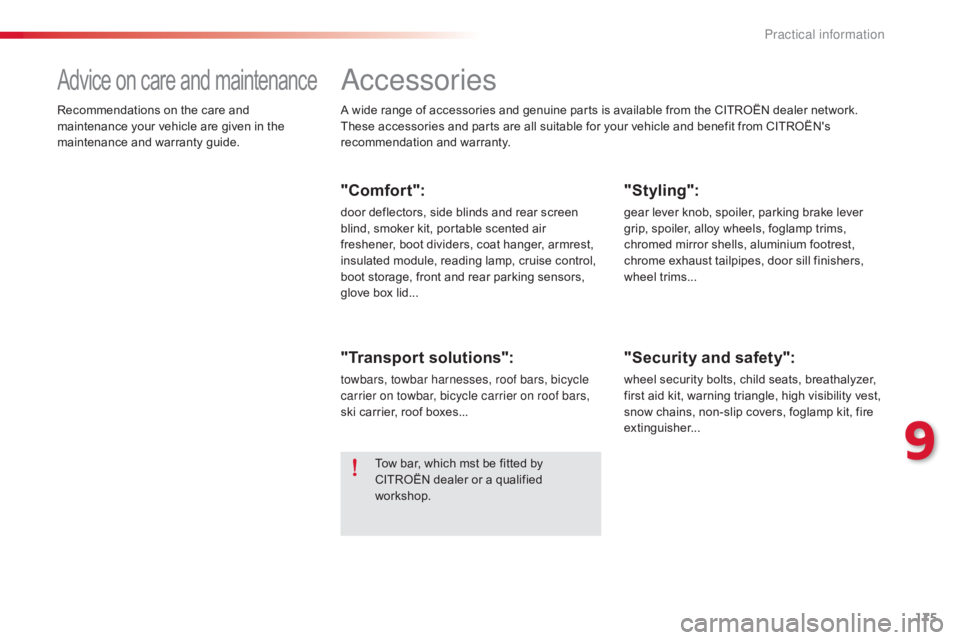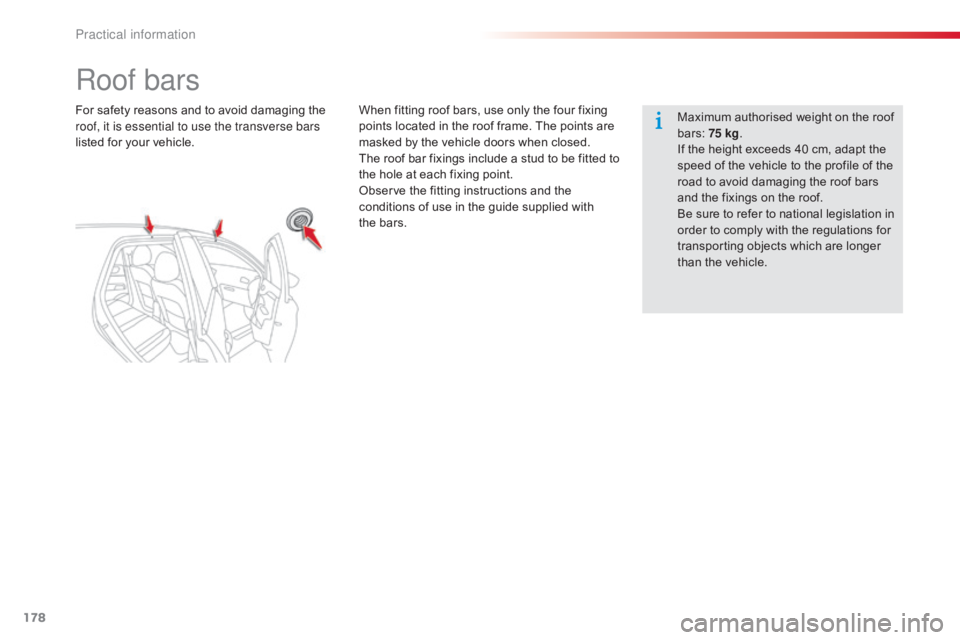CITROEN C-ELYSÉE 2016 Owners Manual
Manufacturer: CITROEN, Model Year: 2016, Model line: C-ELYSÉE, Model: CITROEN C-ELYSÉE 2016Pages: 260, PDF Size: 7.11 MB
Page 171 of 260

169
C-elysee_en_Chap09_info-pratiques_ed01-2016
Changing a wiper blade
Before removing a front
wiper blade
F Within one  minute  after  switching  off  t
he  ignition,  operate  the  wiper  stalk  to Â
p
osition  the  wiper  blades  vertically  on  the Â
w
indscreen.
Removing
F Raise  the  corresponding  wiper  arm.
F  U nclip  the  wiper  blade  and  remove  it.
Fitting
F Put the  corresponding  new  wiper  blade  in  p
lace  and  clip  it.
F
Â
F
old  down  the  wiper  arm  carefully.
After fitting a front wiper
blade
F Switch on  the  ignition.
F  O perate  the  wiper  stalk  again  to  park  the Â
w
iper  blades.
9
Practical information
Page 172 of 260

170
C-elysee_en_Chap09_info-pratiques_ed01-2016
Towing the vehicle
Access to the tools
The towing eye is installed in the boot under the  floor.
To
 gain  access  to  it:
F
o
pen the boot,
F
Â
l
ift  the  floor  and  remove  it,
F
Â
r
emove  the  towing  eye  from  the  holder.
General recommendations
Observe the legislation in force in your country.
E nsure  that  the  weight  of  the  towing  vehicle  is  higher  than  that  of  the  towed  vehicle.
The
 driver  must  remain  at  the  wheel  of  the  towed  vehicle  and  must  have  a  valid  driving Â
l
icence.
When
 towing  a  vehicle  with  all  four  wheels  on  the  ground,  always  use  an  approved  towing Â
a
rm;  rope  and  straps  are  prohibited.
The
 towing  vehicle  must  move  off  gently.
When
 towing  a  vehicle  with  the  engine  off,  there  is  no  longer  any  power  assistance  for Â
b
raking  or  steering.
In
 the  following  cases,  you  must  always  call  on  a  professional  recovery  service:
-
Â
v
ehicle  broken  down  on  a  motor way  or  fast  road,
-
Â
f
our-wheel  drive  vehicle,
-
Â
w
hen  it  is  not  possible  to  put  the  gearbox  into  neutral,  unlock  the  steering,  or  release Â
t
he  parking  brake,
-
Â
t
owing  with  only  two  wheels  on  the  ground,
-
Â
w
here  there  is  no  approved  towing  arm  available...
Procedure
Â
for
Â
having
Â
your
Â
vehicle
Â
towed.
Practical information
Page 173 of 260

171
C-elysee_en_Chap09_info-pratiques_ed01-2016
Towing your vehicleTowing another vehicle
F On the  front  bumper,  unclip  the  cover  by  p
ressing  on  the  left  edge.
F
Â
S
crew  the  towing  eye  in  fully.
F
Â
I
nstall  the  towing  bar. Put
 the  gear  lever  into  neutral Â
(
position
N for an electronic or
automatic  gearbox).
Failure  to  follow  this  instruction  may Â
c
ause  damage  to  some  components Â
(
braking,  transmission...)  and  the Â
a
bsence  of  braking  assistance  when Â
t
he  engine  is  restarted.
F  U nlock  the  steering  by  turning  the  key  i
n  the  ignition  one  notch  and  release  the Â
par
king
 b
rake.
F
Â
S
witch  on  the  hazard  warning  lamps  on Â
b
oth  vehicles.
F
Â
M
ove  off  gently,  drive  slowly  and  for  a  short Â
di
stance.This
 towing  is  strictly  prohibited  (risk  of Â
d
amaging  your  vehicle).
9
Practical information
Page 174 of 260

172
C-elysee_en_Chap09_info-pratiques_ed01-2016
Towing a trailer
We recommend the use of genuine CITROĂ‹N  towbars  and  their  harnesses Â
t
hat  have  been  tested  and  approved Â
f
rom  the  design  stage  of  your  vehicle, Â
a
nd  that  the  fitting  of  the  towbar  is Â
e
ntrusted  to  a  CITROĂ‹N  dealer  or  a Â
q
ualified
 w
orkshop.
If
 the  towbar  is  not  fitted  by  a Â
C
ITROĂ‹N  dealer,  it  must  still  be Â
f
itted  in  accordance  with  the  vehicle Â
m
anufacturer's
 i
nstructions.
Your
Â
vehicle
Â
is
Â
primarily
Â
designed
Â
for
 t
ransporting
Â
people
Â
and
Â
luggage,
Â
but
Â
it
Â
may
Â
a
lso
Â
be
Â
used
Â
for
Â
towing
Â
a
Â
trailer. Driving
 with  a  trailer  places  greater  d
emands  on  the  towing  vehicle  and  the Â
d
river  must  take  particular  care.
Pr
Page 175 of 260

173
C-elysee_en_Chap09_info-pratiques_ed01-2016
Driving advice
Distribution of loads
F Distribute the  load  in  the  trailer  so  that  the  h
eaviest  items  are  as  close  as  possible  to Â
t
he  axle  and  the  nose  weight  approaches Â
t
he  maximum  permitted  without Â
e
xceeding it.
Air
 density  decreases  with  altitude,  thus Â
r
educing  engine  per formance.  Above Â
1Â 0
00 metres,  the  maximum  towed  load  must Â
b
e  reduced  by  10 %  for  every  1 000  metres  of Â
al
titude.
Side wind
F Take  into  account  the  increased  sensitivity  t
o  side  wind.
Cooling
Towing a trailer on a slope increases the temperature  of  the  coolant.
As
 the  fan  is  electrically  controlled,  its  cooling Â
c
apacity  is  not  dependent  on  the  engine  speed.
F
Â
T
o  lower  the  engine  speed,  reduce  your Â
s
peed.
The
 maximum  towed  load  on  a  long  incline Â
d
epends  on  the  gradient  and  the  ambient Â
t
emperature.
In
 all  cases,  keep  a  check  on  the  coolant Â
t
emperature. F
Â
I
f  the  warning  lamp  and Â
t
he STOP
Â
warning  lamp  come Â
o
n,  stop  the  vehicle  and  switch Â
o
ff  the  engine  as  soon  as Â
p
ossible.
Braking
Towing a trailer increases the braking distance.
T o  avoid  overheating  of  the  brakes  on  a  long Â
m
ountain  type  of  descent,  the  use  of  engine Â
b
raking  is  recommended.
Ty r e s
F Check  the  tyre  pressures  of  the  towing  v
ehicle  and  of  the  trailer,  observing  the Â
re
commended
 p
ressures.
Lighting
F Check the  electrical  lighting  and  signalling  o
n  the  trailer.
Refer
Â
to
Â
the
Â
"Technical
Â
data"
Â
section
Â
for
Â
details
Â
o
f
Â
the
Â
weights
Â
and
Â
towed
Â
loads
Â
which
Â
apply
Â
to
Â
y
our
Â
vehicle.
The rear  parking  sensors  will  be Â
d
eactivated  automatically  if  a  genuine Â
C
ITROËN  towbar  is  used.
9
Practical information
Page 176 of 260

174
C-elysee_en_Chap09_info-pratiques_ed01-2016
Very cold climate screen(s)*
Removable protective screen(s) which prevents the accumulation of snow at the radiator cooling fan.
D epending  on  version,  you  have  one  or  two  screens.
Fitting
F Offer up  the  corresponding  screen  to  the  l
ower  or  upper  section  of  the  front  bumper.
F
Â
P
ress  around  its  edge  to  engage  its  fixing Â
c
lips  one  by  one.
Removal
F Use a  screwdriver  as  a  lever  to  release  e
ach  of  the  fixings  of  each  screen  in  turn.
*
Â
Depending
Â
on
Â
the
Â
country
Â
of
Â
sale. Do
 not  forget  to  remove  the  very  cold Â
c
limate  screen  (or  screens):
-
Â
w
hen  the  ambient  temperature Â
e
xceeds  10  °C,
-
Â
w
hen  towing,
-
 a
t  speeds  above  75  mph  (120  km/h).
Practical information
Page 177 of 260

175
C-elysee_en_Chap09_info-pratiques_ed01-2016
Accessories
A wide range of accessories and genuine parts is available from the CITROËN dealer network.
T hese  accessories  and  parts  are  all  suitable  for  your  vehicle  and  benefit  from  CITROĂ‹N's Â
r
ecommendation  and  warranty.
"Comfort":
door deflectors, side blinds and rear screen blind,  smoker  kit,  portable  scented  air Â
f
reshener,  boot  dividers,  coat  hanger,  armrest, Â
i
nsulated  module,  reading  lamp,  cruise  control, Â
b
oot  storage,  front  and  rear  parking  sensors, Â
g
love  box  lid...
"Transport solutions":
towbars, towbar harnesses, roof bars, bicycle
carrier on towbar, bicycle carrier on roof bars,
ski carrier,  roof  boxes...
"Security and safety":
wheel security bolts, child seats, breathalyzer, first  aid  kit,  warning  triangle,  high  visibility  vest, Â
s
now  chains,  non-slip  covers,  foglamp  kit,  fire Â
e
xtinguisher...
Tow
Â
bar,
Â
which
Â
mst
Â
be
Â
fitted
Â
by
Â
C
ITROĂ‹N
Â
dealer
Â
or
Â
a
Â
qualified
Â
w
orkshop.
Advice on care an d m aintenance
Recommendations on the care and m
aintenance  your  vehicle  are  given  in  the Â
m
aintenance
 an
d
 w
arranty
 g
uide.
"Styling":
gear lever knob, spoiler, parking brake lever grip,  spoiler,  alloy  wheels,  foglamp  trims, Â
c
hromed  mirror  shells,  aluminium  footrest, Â
c
hrome  exhaust  tailpipes,  door  sill  finishers, Â
w
heel
 t
rims...
9
Practical information
Page 178 of 260

176
C-elysee_en_Chap09_info-pratiques_ed01-2016
* To avoid  any  risk  of  jamming  of  the Â
pedals:
-
Â
e
nsure  that  the  mat  is  positioned  and Â
s
ecured
 c
orrectly,
-
Â
n
ever  fit  one  mat  on  top  of  another.
"Protection":
mats* (carpet or rubber), seat covers, alarm, front  a nd  r ear  m ud  f laps,  b oot  l iner,  b oot  c arpet, Â
s
ide  rubbing  strips,  bumper  protective  strips, Â
t
ransparent  boot  sill  protector,  shield  under Â
e
ngine...
The
 fitting  of  electrical  equipment  or
 a
ccessories  which  are  not  recommended
 b
y  CITROËN  may  result  in  a  failure  of
 y
our  vehicle's  electronic  system  and
 e
xcessive  electrical  consumption.
Contact
 a  CITROËN  dealer
 f
or  information  on  the  range  of
 r
ecommended  equipment  and
 a
ccessories.
Installation of radio
communication
transmitters
Before installing any after-market radio communication  transmitter,  you  can Â
c
ontact  a  CITROĂ‹N  dealer  for  the Â
s
pecification  of  transmitters  which  can Â
b
e  fitted  (frequency,  maximum  power, Â
a
erial position, specific installation
requirements),
 in  line  with  the  Vehicle Â
E
lectromagnetic
 C
ompatibility
 D
irective (2004/104/EC). Depending
 on  the  legislation  in  force  in Â
t
he  country,  certain  safety  equipment Â
m
ay  be  compulsory:  high  visibility Â
s
afety  vests,  warning  triangles, Â
b
reathalyzers, spare bulbs, spare fuses,
fire  extinguisher,  first  aid  kit,  mud  flaps Â
a
t  the  rear  of  the  vehicle.
By
Â
visiting  a  CITROĂ‹N  dealer,  you  can  also Â
o
btain
 products  for  cleaning  and  maintenance Â
(
exterior  and  interior)  -  including  ecological Â
p
roducts  in  the  "TECHNATURE"  range,  topping Â
u
p
Â
products  (screenwash...),  touch-up  pens Â
a
nd
Â
paint  aerosols  for  the  exact  colour  of  your Â
v
ehicle,  refills  (cartridge  for  the  temporary Â
p
uncture  repair  kit...),  ...
"Multimedia":
audio systems, portable satellite and semi-
i ntegral  navigation  systems,  fixed  and  portable Â
h
ands-free  kit,  universal  solar  charger, Â
s
peakers  and  wiring,  230  V  socket,  rear Â
m
ultimedia  bracket,  telephone  bracket...
Practical information
Page 179 of 260

177
C-elysee_en_Chap09_info-pratiques_ed01-2016
MatsRemovable carpet protection.
W hen  fitting  the  mat  for  the  first  time,  on  the Â
d
river's  side  use  only  the  fixings  provided  in  the Â
w
allet  attached.
The
 other  mats  are  simply  placed  on  the Â
c
arpet.
Fitting RemovalRefitting
To avoid any risk of jamming of the ped
als:
-
Â
o
nly  use  mats  which  are  suited  to Â
t
he  fixings  already  present  in  the Â
v
ehicle;  these  fixings  must  be  used,
-
Â
n
ever  fit  one  mat  on  top  of  another.
The
 use  of  mats  not  approved  by Â
C
ITROĂ‹N  may  inter fere  with  access  to Â
t
he  pedals  and  hinder  the  operation  of Â
t
he  cruise  control  /  speed  limiter.
To
Â
remove
Â
the
Â
mat
Â
on
Â
the
Â
driver's
Â
side:
F
Â
m
ove
Â
the
Â
seat
Â
as
Â
far
Â
back
Â
as
Â
possible,
F
Â
u
nclip
Â
the
Â
fixings,
F
Â
r
emove
Â
the
Â
mat.
To
Â
refit  the  mat  on  the  driver's  side:
F
Â
p
osition  the  mat  correctly,
F
Â
r
efit  the  fixings  by  pressing,
F
Â
c
heck  that  the  mat  is  secured  correctly.
9
Practical information
Page 180 of 260

178
C-elysee_en_Chap09_info-pratiques_ed01-2016
Roof bars
For safety reasons and to avoid damaging the roof, it is essential to use the transverse bars
listed
 for  your  vehicle. When
 fitting  roof  bars,  use  only  the  four  fixing  p
oints  located  in  the  roof  frame.  The  points  are Â
m
asked  by  the  vehicle  doors  when  closed.
The
 roof  bar  fixings  include  a  stud  to  be  fitted  to Â
t
he  hole  at  each  fixing  point.
Observe
 the  fitting  instructions  and  the Â
c
onditions  of  use  in  the  guide  supplied  with Â
t
he bars. Maximum
 authorised  weight  on  the  roof Â
b
ars:
 75
kg.
If
 the  height  exceeds  40  cm,  adapt  the Â
s
peed  of  the  vehicle  to  the  profile  of  the Â
r
oad  to  avoid  damaging  the  roof  bars Â
a
nd  the  fixings  on  the  roof.
Be
 sure  to  refer  to  national  legislation  in Â
o
rder  to  comply  with  the  regulations  for Â
t
ransporting  objects  which  are  longer Â
t
han  the  vehicle.
Practical information